What can be done when voters cannot identify with any of the candidates in the elections? Is there a threat that the next elections in Poland will be manipulated? Is it worth doing local debates for small groups of participants? These and other questions were asked during a three-hour debate in Lubartów (Est of Poland, town with 22,000 inhabitants).
The experts invited to participate in a debate represented a diverse but somewhat similar experience. These were namely, the academic – prof. Mikołaj Cześnik, activist with national perspective – Róża Rzeplińska and activists with local experience – related to the change in the quality of government in Lublin (the nearest bigger town) – Krzysztof Jakubowski. The debate was led by a journalist – Anna Gmiterek-Zabłocka. The audience was also not accidental – apart from the main organizers from the Lubartów – Citizens’ City, there were interested inhabitants, politicians and the media.
Ró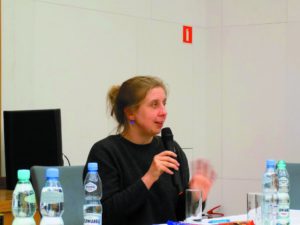 ża Rzeplińska (mamprawowiedziec.pl), who has devoted the last dozen or so years to encourage voters for “smart voting”, shared her view on what should be done before the elections. As she emphasized, local elections are unique. It is much easier to imagine that political decisions matter and what they may concern. Therefore, voters can e.g. set individual goals – a road for bicycles through the entire town, a new kindergarten, development of a park for residents or favorable solutions for local entrepreneurship. Having it in mind, voters should search for a candidate who shares a view on the importance of the same areas. And if he or she does not see such people? Perhaps it is worth persuading someone to become such a representative or become involved himself or herself. To support this view, Professor Cześnik (SWPS University of Social Science and Humanities) added that on the local level also individual voice matters more. In case of Lubartów, in the earlier elections, some candidates won only by 4 votes.
ża Rzeplińska (mamprawowiedziec.pl), who has devoted the last dozen or so years to encourage voters for “smart voting”, shared her view on what should be done before the elections. As she emphasized, local elections are unique. It is much easier to imagine that political decisions matter and what they may concern. Therefore, voters can e.g. set individual goals – a road for bicycles through the entire town, a new kindergarten, development of a park for residents or favorable solutions for local entrepreneurship. Having it in mind, voters should search for a candidate who shares a view on the importance of the same areas. And if he or she does not see such people? Perhaps it is worth persuading someone to become such a representative or become involved himself or herself. To support this view, Professor Cześnik (SWPS University of Social Science and Humanities) added that on the local level also individual voice matters more. In case of Lubartów, in the earlier elections, some candidates won only by 4 votes.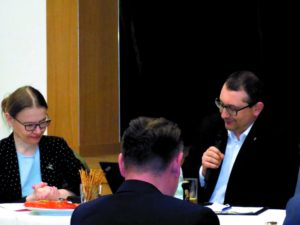
Anna Gmiterek-Zabłocka (Radio TOK FM) quoted the concerns of her audience. Some listeners were afraid that elections in 2018 may be manipulated. These fears met with the opposition of Mikołaj Cześnik and Krzysztof Jakubowski (Freedom Foundation). The first one indicated that such a way of thinking started with delays in providing results of elections in 2014. It was accompanied with accusations of forgery by opposition politicians. Afterwards the results of elections were thoroughly examined and there were no grounds for such radical statements. Unfortunately, it has been extremely easy since then to negate the fairness of the elections. The best way to have an own opinion and to oversee the process is to become a member of the electoral commission. This approach was supported by Krzysztof Jakubowski, who confirmed that he has set in the commission for years on behalf of various party electoral committees. And that it is an informative and even profitable work (Commission members receive remuneration). His joke about profitability was 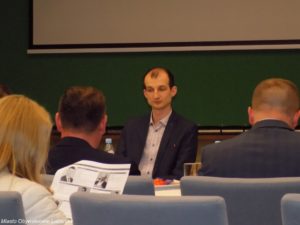 immediately counteracted by one of the participants in the debate, who stressed that the members of Commission should be educated, thoughtful and focused. He cited an example from Lubartów in 2014. After counting the votes, two candidates received the same number of ballots. Before choosing between two of them randomly, the members of the Commission requested reclassification of the ballots. It turned out that there was a miscalculation. Therefore, knowledge of procedures and reliability are important factors when exercising a function. These discussions were accompanied by a reflection that, according to the new electoral code, the next elections will require a huge number of people involved. There is a need of doubled compositions of the electoral commissions. One composition of people will be on duty at the Commission throughout the day, others will count votes when elections are finished. And in fact, the threats were connected with this legal requirement. Such a big number of people may be difficult to recruit, and that means a threat to the possibility of holding elections. Mobilization is therefore even more important.
immediately counteracted by one of the participants in the debate, who stressed that the members of Commission should be educated, thoughtful and focused. He cited an example from Lubartów in 2014. After counting the votes, two candidates received the same number of ballots. Before choosing between two of them randomly, the members of the Commission requested reclassification of the ballots. It turned out that there was a miscalculation. Therefore, knowledge of procedures and reliability are important factors when exercising a function. These discussions were accompanied by a reflection that, according to the new electoral code, the next elections will require a huge number of people involved. There is a need of doubled compositions of the electoral commissions. One composition of people will be on duty at the Commission throughout the day, others will count votes when elections are finished. And in fact, the threats were connected with this legal requirement. Such a big number of people may be difficult to recruit, and that means a threat to the possibility of holding elections. Mobilization is therefore even more important.
During the debate, some of its participants mentioned that the citizens are becoming increasingly aware of what the self-government authority deals with. Mikołaj Cześnik associate d that interest with increased emigration to the countries of mature democracy. As a result, people are better informed of how democracy can function. We know this phenomenon as well. Many people we work with are just such “returning from abroad”. Therefore the question whether they are also more willing to oversee the self-government was a natural consequence. Especially since this type of engagement becomes to be very popular at the national level. Both, organizers from the Lubartów Citizens’ City – Anna Gryta and Elżbieta Wąs, as well as Krzysztof Jakubowski from Lublin, admitted that for the time being it is difficult to talk about the explosion of civic interest in the quality of exercising power. This confirms the observation of Watchdog Poland that there is more initiatives on the local level all over Poland but people involved are relatively lonely in their activity.
d that interest with increased emigration to the countries of mature democracy. As a result, people are better informed of how democracy can function. We know this phenomenon as well. Many people we work with are just such “returning from abroad”. Therefore the question whether they are also more willing to oversee the self-government was a natural consequence. Especially since this type of engagement becomes to be very popular at the national level. Both, organizers from the Lubartów Citizens’ City – Anna Gryta and Elżbieta Wąs, as well as Krzysztof Jakubowski from Lublin, admitted that for the time being it is difficult to talk about the explosion of civic interest in the quality of exercising power. This confirms the observation of Watchdog Poland that there is more initiatives on the local level all over Poland but people involved are relatively lonely in their activity.
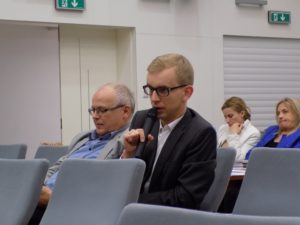 Finally, the question was raised whether encouraging people to participate in the elections is not a tilting at windmills. The fact that only 20 people attended the debate in this 22,000- inhabitants town was seen as a prove of uselessness of any efforts. But according to this logic, even fewer people come to meetings in Warsaw. After all, even a group of one hundred people in Warsaw is a percentage much lesser than in Lubartów. The problem is not
Finally, the question was raised whether encouraging people to participate in the elections is not a tilting at windmills. The fact that only 20 people attended the debate in this 22,000- inhabitants town was seen as a prove of uselessness of any efforts. But according to this logic, even fewer people come to meetings in Warsaw. After all, even a group of one hundred people in Warsaw is a percentage much lesser than in Lubartów. The problem is not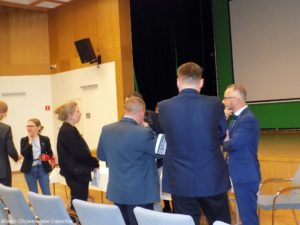 new. We have been traveling all over Poland for years. We know that relatively few people are interested in the rights of residents. Unless there is a conflict in the village or a matter that is practically important for the residents they have no reason to get interested. As regards whether it is worth organizing meetings for twenty people, we have no doubts about it. Let the need be evidenced by the fact that the discussion dragged on for an extra hour. In a big city there are many people with whom interested people can discuss their point of view and shape it. In a small one – by the mere fact that there is fewer people – such occasions are rare. They should be created. How can we talk about Poland if we do not have the opportunity to do it?
new. We have been traveling all over Poland for years. We know that relatively few people are interested in the rights of residents. Unless there is a conflict in the village or a matter that is practically important for the residents they have no reason to get interested. As regards whether it is worth organizing meetings for twenty people, we have no doubts about it. Let the need be evidenced by the fact that the discussion dragged on for an extra hour. In a big city there are many people with whom interested people can discuss their point of view and shape it. In a small one – by the mere fact that there is fewer people – such occasions are rare. They should be created. How can we talk about Poland if we do not have the opportunity to do it?
More materials on changes in electoral law is avalilable on the website of Citizens Observatory.
***
Te debate was organized within the “Common Denominator”. – Traveling Discussion Club. The Club was a part of the project by Political Capital Institute from Hungary and Institute for Public Affairs from Poland entitled “Building Constructive Dialogue in Central Europe”. Citizens Newtork Watchdog Poland was a partner responsible for organizing part of the program concerning local debates. It was financed by National Endowment for Democracy.

Comments